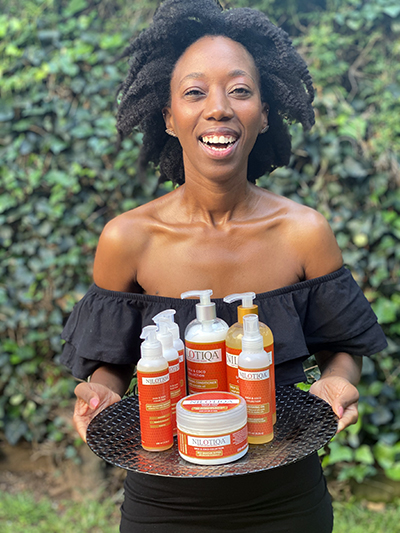News & Events
Unisa alumna a haircare entrepreneur second to none
The growth, strength, look, feel and smell of hair drove Thokozile Mangwiro to establish her own hair business. Not only were her dreadlocks of 20 years long, dry and hard, but they also needed more nourishment and care.

Thokozile Mangwiro with her product range
For 15 years she tried this and that, and mixed homemade solutions and word-of-mouth recipes for her hair but it was still not enough. According to Thokozile, many products were available worldwide, but none was what she wanted. “As a result, I often found myself in between products. There was no perfect product available.”
This led to a bold, exciting and fun quest to create her own hair brand. Nilotiqa was gradually born and in 2016 launched as a natural hair care brand. Determined to professionalise the natural hair care market, Thokozile embarked for years on extensive research with natural ingredients such as shea butter, marula oil and avocado oil.
The research also involved becoming acquainted with the structure of African hair and skin, and ingredients most suitable for them. All these ingredients went through rigorous testing to ensure that they remained organic and natural and were able to moisturise and nurture natural hair.
“Most importantly, my products are completely South African, from the ingredients to the production process,” Thokozile says. Nilotiqa is making waves in the retail market. It has been sharing shelf space with other famous brands for the past three years, ensuring that natural hair thrives.
“I am a proud alumna of Unisa,” says the Krugersdorp-born entrepreneur. “The institution was introduced to me at an early age. My mother studied at Unisa when we were still babies. She used to visit the Muckleneuk Campus in Pretoria and walked with us up the famous hill. Unisa was always in our lives.”
“I also studied for my master’s in Information Technology from 2013 and 2015 at Unisa. It fit the phase in my life at the time. I had a baby and was working at the same time, and so I needed some balance. Unisa was there to keep me on track,” she says.
Thokozile says that studying long distance made her feel comfortable. “I would be with my baby in the car while accessing the campus in Florida, Johannesburg. Time was of the essence as I was also establishing my business at the time.”
Unisa helped her to become self-driven and focussed. “I was drawn to the corporate world where you are expected to complete a project after starting it. Studying at a distance, I could accomplish that,” she says.
Thokozile Mangwiro hopes to take entrepreneurship to greater heights, as she believes she studied at an institution that will help take her into the future.
* By Busisiwe Mahlangu, Communications Coordinator, Directorate: Institutional Advancement
Publish date: 2021/04/20
